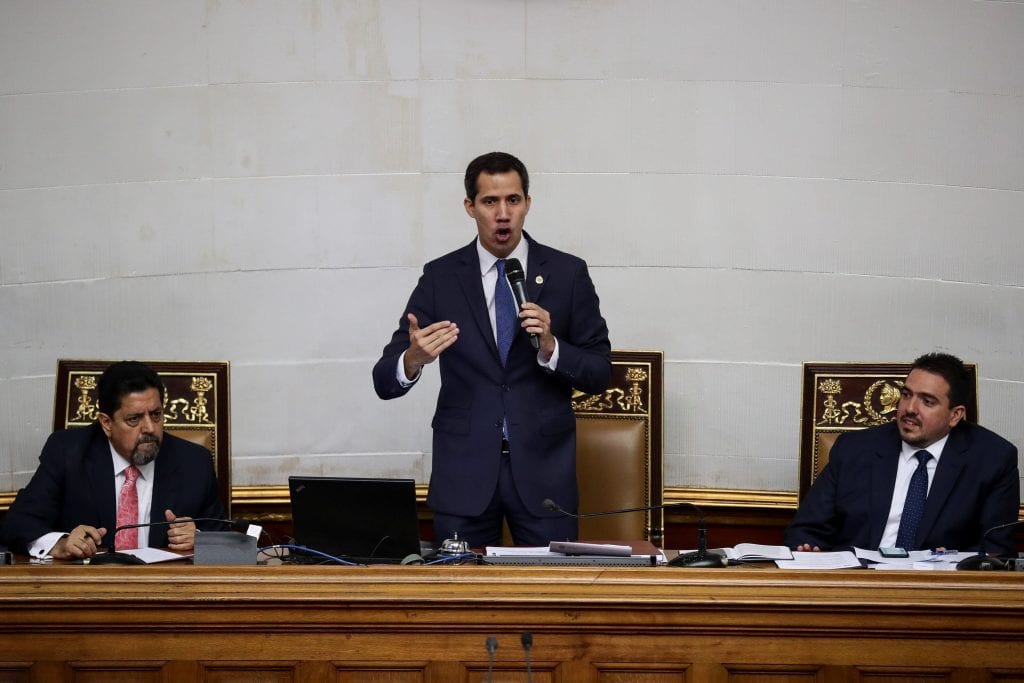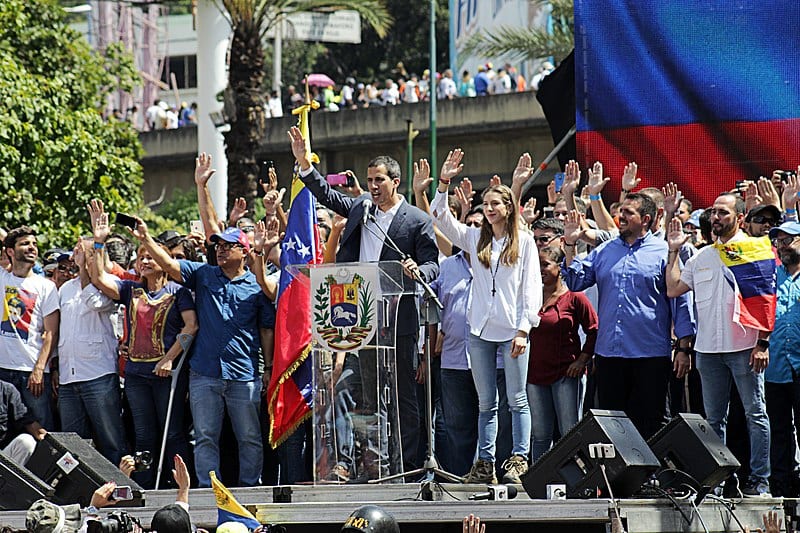
The Venezuelan National Assembly with an opposition majority approved a new agreement to a route that is not clearly established. It only refers to “free and fair” elections in the South American country and bets on dialogue promoted by Norway.
En serio una "ruta política integral" manteniendo la usurpación de Maduro y su cohorte? Las elecciones, además de libres y transparentes, deben ser CREÍBLES.
No entiendo esta decisión súbita de asimilar el chavismo y liquidar la hoja de ruta para #Venezuela, @AsambleaVE @jguaido https://t.co/AH7cG1OQZ8— Beatriz Becerra 🇪🇦 (@beatrizbecerrab) October 2, 2019
This is a political route that reiterates the willingness of the interim administration of Juan Guaido to continue participating in a dialogue hosted by Norway although he had previously announced that the Barbados mechanism had been “exhausted.”
The document ratifies the creation of a “transitional government” that will lead the country to free elections; however, the text has no reference to the end of usurpation by Nicolas Maduro.
The agreement does not specify the way to reach such a transitional government and places all the hopes of the National Assembly in a presumptive transparent election. It also mentions the Kingdom of Norway as the sole guarantor of a political agreement with Maduro, thereby illustrating the willingness of the interim government to continue dialogue despite nine failed attempts and breaches by the regime.
The new document approved by the National Assembly seems to replace the “Statute Governing the Transition to Democracy to Re-establish the Validity of the Constitution of the Bolivarian Republic of Venezuela” approved in February 2019.
This statute also included the “road map” that Guaido himself had created and sworn to. It entailed “putting an end to usurpation,” or in other words, achieving the ousting of Nicolas Maduro’s regime as the first step, then forming a transitional government, and subsequently, calling for free elections.
The difference is that the new document, instead of mentioning a “road map,” speaks of “a comprehensive political route.” This time, we once again talk of “seeking solutions within the framework of the process facilitated by the Norwegian government;” that is, dialogue.
It is noteworthy that four of the eight points agreed upon in the document speak of presidential elections even though Maduro’s regime has explicitly indicated that the only elections to be held in Venezuela would be legislative elections. Further, Maduro has also expressed to “vox populi” that he will not leave power peacefully.
The seventh point in the agreement is also striking because it refers to a “political, constitutional, and peaceful solution” for the South American country, leading us to conclude that the Venezuelan National Assembly would rule out the possibility of invoking mechanisms such as the TIAR or the Responsibility to Protect (R2P) that would allow, in the short, medium, or long term, the formation of an international military coalition.
It seems that the National Assembly is not on the same page as Gustavo Tarre Briceño, Venezuela’s ambassador to the Organization of American States (OAS) appointed by Juan Guaido. Recently, the ambassador began a campaign to explain that although the ideal solution in Venezuela would be through elections and dialogue, this will not be possible since the Chavista regime is not interested in stepping down.
On 13h September, Tarre said, “There are people who quite rightly say that we have to engage in dialogue, we have to talk, the peaceful solution is the most appropriate; and of course it is. But how many years have we Venezuelans tried to have a dialogue with a government that mocks us.”
“Everyone knows how Noriega left. Who knows what the situation in Panama would have been today if there had not been an intervention. So I request the countries to propose options other than repeating blah blah blah and dialogue, and we are open to any solution that produces Maduro’s departure.”
“Venezuela is perhaps the most important transit center for drug trafficking in the world. How do we deal with that, with dialogue, with rose petals? Here, we need a solution that necessarily demands the use of force; and refusing to use force is a mistake,” he concluded.
Jose Vicente Haro, a constitutional lawyer and political scientist, criticized the fact that the new agreement approved by the National Assembly does not mention the “cessation of usurpation.”
“The word: usurpation. It was removed from the accord, from the articles of the agreement, which are the new roadmap for political purposes,” he said.

It appears that the cessation of usurpation would only happen through elections
Guaido has pointed out that there is only one objective: an end to presidential usurpation, the establishment of a transitional government, and call for “free” elections with international observation in Venezuela. However, everything indicates that the order of this premise will be modified.
During his appearance in the National Assembly, Congressman Henry Ramos Allup ruled out the possibility of a military coalition against Nicolas Maduro’s regime. In his statements, he asserted that the cessation of usurpation could only occur through elections although it contradicts the premise established by Guaido at the beginning of the year.
#2Oct #Venezuela En otras palabras: Ni “incentivos para el quiebre dentro de la Fuerza Armada” ni “TIAR”. Solo: elecciones “libres” (no elecciones “auténticas”). Olviden lo demás, eso era un: “como vaya viniendo, vamos viendo”. En fin… https://t.co/UrzeIJwRu6
— JOSE VICENTE HARO (@JOSEVICENTEHARO) October 2, 2019
“No soldier from any country will come here to shoot in Venezuela if I don’t have any means to stop the usurpation and I am told that the way to stop the usurpation is to hold free elections, because I work to death, feverishly, and to the extreme to achieve free elections for those of us who don’t want slaughter or civil war, or foreign invasions, or coups d‘État,” Ramos Allup said in his speech.
“Renouncing change”
The United States government, which in fact has become the principal ally for democracy in Venezuela, has expressed its position regarding potential elections with the Chavista regime still in power. Both Elliott Abrams, Venezuela’s special emissary, and Secretary of State Mike Pompeo, agree that holding elections under these conditions would imply “forgoing change in Venezuela.”
In July 2019, the U.S. officials opposed holding elections in Venezuela without first ending Maduro’s usurpation, according to an interview with ABC Spain and Pompeo’s statements in the media.
“Clearly, there must be new free and fair elections. And it is not possible for there to be free and fair elections with Maduro in office. I have heard from our partners, some in Europe, that they can send election observers and that electoral power can be reformed. It does not matter. In the transition period, Maduro will continue to be in charge of the army, the police, intelligence, and colectivos (armed civilian groups), and will continue to control all sources of violence and intimidation,” Abrams told ABC.
For us, the answer is that elections cannot happen with Maduro in power. How can a transitional government be formed with him in office? For us to accept elections and allow Maduro to hold on to the presidency is equivalent to forgoing change.
On 25th September, the president of Ecuador, Lenin Moreno, pointed out that Maduro should leave power and immediately call for elections in Venezuela.
“Maduro must leave power and immediately call for elections. It is the only way out for this nation. It needs precisely, I emphasize again, elections with broad international observation,” he said.
Congressman Eduardo Bolsonaro, son of Brazilian President Jair Bolsonaro, issued harsh criticism of the Venezuelan opposition that negotiates “free elections” without the necessary conditions or guarantees for them to take place in the South American country.
Bolsonaro, who has become a critical voice from Brazil and is also an ally in the struggle for democracy in Venezuela, referred directly to the Venezuelan opposition, making clear his position against elections while Nicolas Maduro continues to usurp the presidency.
“With Nicolas Maduro in Venezuela, free elections are impossible. This has already been proven, and it was in vain. The opposition that negotiates an election with Maduro does not deceive anyone else; maybe it only deceives itself,” he said.
Requirements for truly free elections
Maduro has won the elections through several actions that damage the Venezuelan opposition: he prevents the registration of new voters, modifies the voter registry, relocates the voting centers at the last minute, eliminates the use of indelible ink and fingerprints, violates the law by preventing the substitution of candidates on the card, and grants advantages to the ruling party. Additionally, many voters are demotivated, and the regime manipulates figures.
Roberto Abdul, president of the steering committee of the civil association Sumate, an NGO with technological and logistical experience in coverage of electoral events, told the PanAm Post that for the elections to be transparent it is necessary to change the electoral authorities that have worked for years in favor of the Chavista regime.
He also pointed out that it is essential to purge the Permanent Electoral Registry (REP) and to empower the political organizations that were annulled by the CNE. Purging the REP would involve clearing lists of duplicate registrations that has enabled some Venezuelans to cast their vote more than once in any given election.
When talking about free and transparent elections, one should also take into account the dismantling of the armed groups that support Chavismo, such as the collectives the Colombian guerrillas, “dissidents” of the Revolutionary Armed Forces of Colombia (FARC) and the National Liberation Army (ELN) which operate from Venezuela, the Special Action Forces (FAES), and many others.
Thus, free elections in Venezuela require more than the exit of Maduro and the renovation of the CNE. Chavismo must abandon all spheres of power. The country has to implement a shock force against the armed groups that guard the dictatorship and could influence the vote. Venezuela also needs candidates with an impeccable resume and the oversight of an impartial international body that will guarantee transparency in the election process.
 Versión Español
Versión Español













